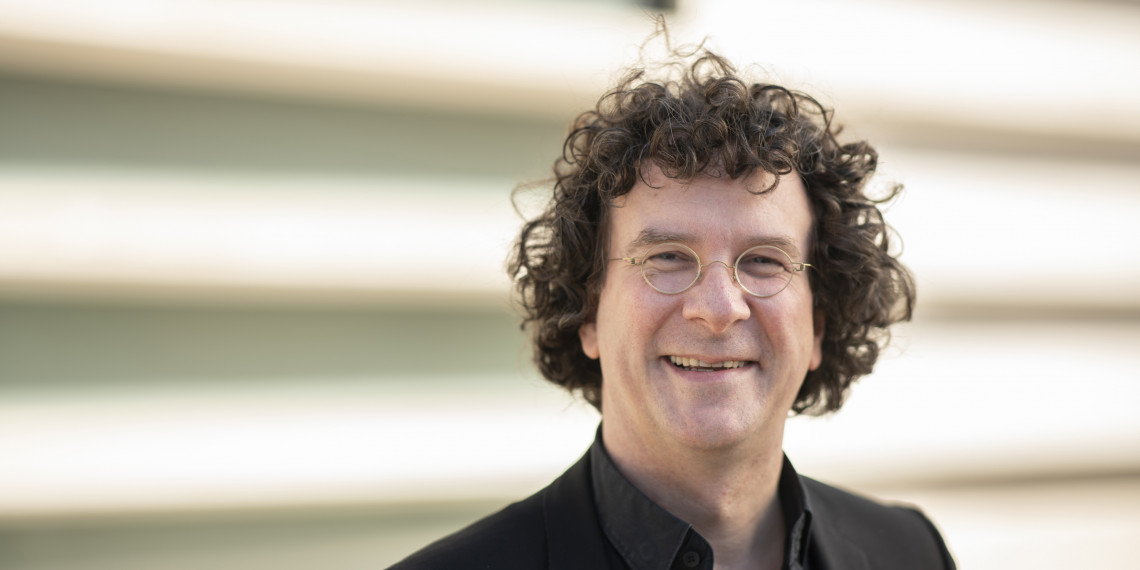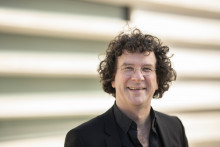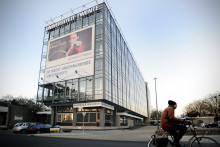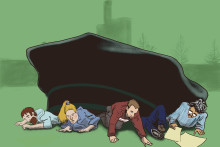The philosopher is seated at the kitchen table in his home near the city centre of Enschede. Verbeek has just returned from a holiday in Greece with his family. They travelled by car and one of his four sons had completely mapped out the itinerary. ‘It was delightful’, says Verbeek enthusiastically. 'We saw so many things. And of course, Athens is the place where philosophy pretty much originated. I stood in front of Socrates’ prison, awed by the fact that he had actually been imprisoned there. It was really cool.’
Love at first sight
Shortly before leaving for Greece for the summer holidays, Verbeek was announced as the new rector magnificus of the University of Amsterdam (UvA). A few months earlier, a recruitment and selection agency had reached out to the philosopher to see if he would be interested in the position. Initially, he had refused. ‘But when I studied the vacancy more closely, I realised that the described profile perfectly matched who I am and what I’m capable of. I agreed to a meeting and it turned out to be love at first sight.’
The UvA is looking for an active scientist as rector, who knows how to connect science and society. ‘In the current world, science and society are increasingly converging. Take Covid-19, the nitrogen emissions crisis or climate change, for example. When it comes to the big social questions we are faced with, we need each other. As rector, I will not only be running the place, but I can also help shape the new role of the university in the twenty-first century. That challenge makes me very happy, especially as a philosopher.’
Verbeek accepts the new position in Amsterdam and a few months later, he is announced as the new rector of the largest university in the Netherlands. Besides the joy over his appointment, the professor experiences another feeling that calls for consideration. ‘It almost feels like disloyalty to leave a place where you’ve been treated so well for 35 years. I love it here in Twente and I’m definitely not leaving out of discontent. I have absolutely nothing negative to say about the UT. But the position of rector at the UvA was simply an offer you can't refuse.’
'After being awarded my Vici, I started to feel anxious. I thought: am I just going to repeat the same old story for the rest of my life?'
Philosophy in Twente
It is no wonder that Verbeek has a hard time saying goodbye. The campus has been his home for over 35 years. After graduating secondary school, Verbeek moved from Berlicum in Brabant to Twente to follow WWTS, a programme in Philosophy of Science, Technology and Society. ‘I chose WWTS because I couldn’t choose. In secondary school I liked ancient languages just as much as I liked maths, plus I was pretty good at both. In WWTS, we got to study both the humanities and the sciences after a first year in engineering. During my studies, I discovered that ultimately, my heart was more in philosophy.’
The arrival of philosopher Hans Achterhuis at Twente in 1990 was pivotal to his development. The first ‘Denker des Vaderlands’ became an important tutor for Verbeek. ‘Hans is an incredibly socially engaged philosopher. I was engaged too, but not so much in terms of my philosophy. Partly because of Hans, who also supervised me in writing my dissertation, I started to become more so. My doctoral research focused on the question: how can we think about technology from a technical perspective? In other words, how do all those machines affect us as human beings? This way, I could also focus on the ethics and responsibility of developers, and thus link the engagement to the philosophical content.’

Photo: Verbeek at the press presentation of the CoronaMelder app at the DesignLab (photo by Frans Nikkels)
Scientific career
After completing his dissertation, Verbeek tells us there was a gap in his career. Although he was appointed as a lecturer at the UT, the young researcher had no idea how to further shape his scientific career. ‘Until Hans told me: “There are new grants available, the Veni-Vidi-Vici grants; that would be perfect for you.” I went to see him the day before the deadline. With pizza and a bottle of wine on the table, we wrote an application about how to talk about machines in ethical terms. The proposal was accepted by funding body NWO (Dutch Research Council) and that was the start of my scientific career.’
'Nowadays, the intellectual debate is often disconnected from society, which fuels polarisation and distrust. I think that this alienation is extremely harmful'
What followed was a Vidi grant and in 2014 he was even awarded a Vici grant, the highest personal grant in the Netherlands, for his research into the interaction between humans and technology. ‘After being awarded this grant, I started to feel anxious. I thought: am I just going to repeat the same old story for the rest of my life? Although the Vici grant was of course a dream come true for a scientist, I felt like I was being driven into a corner where only internal scientific achievements mattered. Whereas I wanted make more of a social impact. That’s why I accepted a position on the supervisory board of research institute TNO, in order to realise this social ambition.’
Ivory tower
Social and administrative ambitions started to play an increasingly important role in Verbeek’s daily activities. This led to board and committee positions at the Rathenau Institute and UNESCO, among others. Within the UT, Verbeek’s social engagement became evident through his crucial role in setting up the DesignLab. ‘That is perhaps what I’m most proud of’, says the philosopher. ‘It’s a place where science and society meet, where we bring in the outside world, and the ivory tower of academia is torn to the ground. Nowadays, the intellectual debate is often disconnected from society, which fuels polarisation and distrust. I think that this alienation is extremely harmful. Restoring that trust is what motivates me enormously.’
Not that Verbeek sees no place for fundamental research, which is purely aimed at acquiring knowledge, at universities. ‘I don’t mind at all when researchers conduct science for the sake of science; I also enjoy puzzling things out. But my own experience is that, as a scientist, you inevitably operate in a social context. That’s just who I am and that is why the DesignLab feels like a home base. Meanwhile, other universities are following Twente’s example. My role in the DesignLab has probably also played a part in my being considered as rector of the UvA.’

Photo: Verbeek on piano with the 'professor's band' during UT's 2018 New Year's Breakfast (photo by Gijs van Ouwerkerk).
The same DNA
In 2018, Verbeek is appointed university professor at the UT, partly because he embodies the high-tech, human touch profile of the University of Twente through his research into the connection between technology and society. ‘Thom Palstra (the then rector, Ed.) gave me the assignment of promoting and strengthening the UT’s profile, a kind of ambassadorship, both to the outside world and within the UT itself.’ In recent years, the technical philosopher has served as a figurehead and has been a welcome guest or ‘host’ both within and outside the university. The only question that remains is why he did not become rector in Twente. Verbeek answers the question with a smile. ‘The thought has certainly crossed my mind at times, but it just didn’t work out that way. It takes time for something like that to develop. It’s only now that I feel the real ambition to become rector of the UvA.’
According to the technical philosopher, the two universities have a lot in common, despite the difference in scale. ‘As a smaller, peripheral university, the UT is a real breeding ground for new and innovative ideas. Take TechMed or before that the major-minor system, for example. Here, things get done faster and easier. The UvA has the same DNA. The university is open to innovation and, like the UT, is socially engaged. But it’s not a small testing ground. It’s a large place, with four campuses and 42,000 students, where we can develop things on a large scale. The essence remains the same, but the scale and impact will be different.’
'Working at a university is not just a job to earn money, it’s a way of life. In that sense, I’m losing a part of myself'
As future rector, Verbeek has some major challenges ahead of him. Work pressure, social safety and financing: the universities are under great pressure. ‘I have, of course, thought carefully about whether I really wanted it. The culture at UvA is very different from that at the UT. The directness of Amsterdam is quite a contrast to the conviviality of Twente, but I think that’s a good thing. Behind the sometimes heated discussions lies a deep engagement. As rector, I have to see to it that the university functions well internally, allowing scientists to let their creativity flow and giving students their academic education, and externally I have to try and answer the big questions in society. I get to try out both things now. Whether I can do it, I’m of course not sure yet’, Verbeek grins.
Farewell and reflection
As of October, the technical philosopher will commence his duties in Amsterdam. For the time being, Verbeek will continue to live in Enschede with his family. ‘This means that I will have to catch the 6.15 am train every day, because I don’t like the idea of only spending weekends in Enschede. My wife, who already works in Utrecht, and I see the coming year as a transition year. Our youngest is in his last year of primary school. After that, we will decide where we want to live. In the long term, a move to the west is the obvious choice, but exactly where we will end up is not certain yet.’
On 29 September, Verbeek will bid farewell to the UT with a symposium during which he will enter into discussion with three generations – Hans Achterhuis, Mascha van der Voort and Patricia Reyes – about the connection between technology and society. ‘I find it hard to say goodbye. Working at a university is not just a job to earn money, it’s a way of life. In that sense, I’m losing a part of myself. Fortunately, something wonderful will take its place.’







